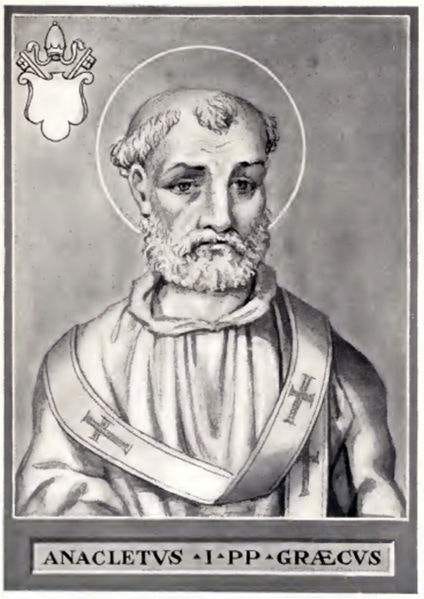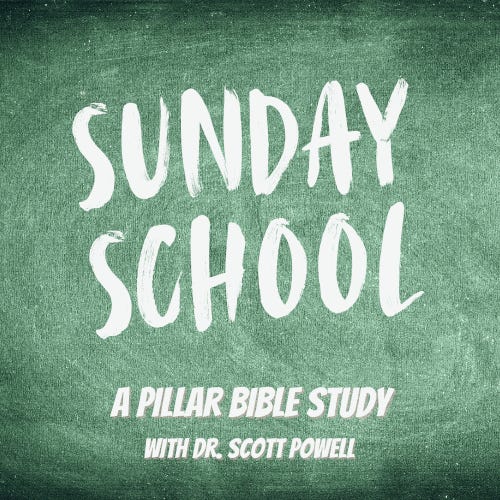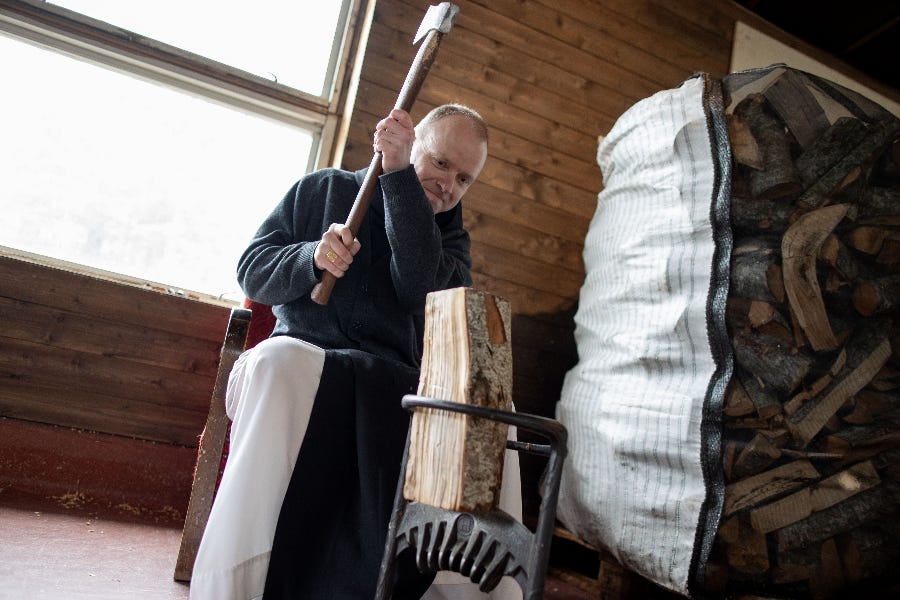Hey everybody,
Today is the feast of St. Cletus, and you’re reading The Tuesday Pillar Post.
Cletus, of course, was the third bishop of Rome, the second successor of St. Peter.
He is known today mostly as the guy who comes between Linus and Clement in the Roman Canon of the Mass.
But there is more to know about the great St. Cletus: The former pope is traditionally regarded as the one to divide the Diocese of Rome into 25 parishes, and thus to inaugurate the parish as the basic locus of the Christian life for most Catholics.
Cletus is remembered as a martyr for the faith, and was probably martyred in the first organized persecution of Christians in the Roman Empire, which took place in 92 A.D.
He appears in St. Peter’s invective against abuses of office, authority, and power in Dante’s “Paradiso”:
The spouse of Christ has never nurtured been
On blood of mine, of Linus and of Cletus,
To be made use of in acquest of gold;
But in acquest of this delightful life
Sixtus and Pius, Urban and Calixtus,
After much lamentation, shed their blood.Our purpose was not, that on the right hand
Of our successors should in part be seated
The Christian folk, in part upon the otherNor that the keys which were to me confided
Should e'er become the escutcheon on a banner,
That should wage war on those who are baptized;Nor I be made the figure of a seal
To privileges venal and mendacious,
Whereat I often redden and flash with fire.
Pray for us, St. Cletus, and for the Holy Church which you led, and for which you became a martyr.
The News
Easter in Ukraine
Sunday was Easter for most Christians in Ukraine, including Ukrainian Greek Catholics who observe the Julian calendar.
With the war still raging, the Sacred Triduum in Ukraine was punctuated by bombings and air raid signals. Our Ukrainian correspondent, Anatolii Babyinski, brings you the scene from Ukraine’s Holy Week:
Churches of the Byzantine tradition reflect on Holy Thursday upon 12 passages from the Gospels, which depict the suffering and death of Christ. They are read aloud, liturgically, between 5:00 and 9:00 pm.
During those sacred hours this year, Ukrainians across the country were ordered twice to seek refuge in bomb shelters, as air raid signals overheard blared out warning sounds.
…
The morning that Holy Week began in Ukraine, it started with a missile strike in Lviv.
Fr. Yuriy Shchurko, dean of the theological faculty of the Ukrainian Catholic University, told The Pillar that he had not yet gone down to a bomb shelter with his wife and children when he saw a missile flying in the sky, and then heard explosions.
"At such moments you feel how real it all is. Yes, it didn't fall in my yard. But many people in Ukraine today live under constant shelling, sitting in basements, and explosions are constantly heard over their heads,” he said.
“This is horror on the verge of surrealism. All this shows that evil is not an abstraction; it is real, disgusting, and scary.”
…
“These days we are singing Psalm 87,” where there are such words as “You have put me in the depths of the pit, in the dark and deep regions,” Maksym Tymo told The Pillar, “and I immediately remember that many our people are now in the dungeons. Alive people who suffer without food and water, hiding from the bombing.”
New trouble in Tennessee
Most readers of The Pillar know that Bishop Rick Stika of Knoxville, Tennessee, has been under fire for more than a year: The bishop has admitted to replacing an investigator looking into the allegation that a seminarian raped a parish employee, because he “knew in [his] heart” the seminarian was innocent.
Stika has been investigated for that allegation, though no results have been announced by the Vatican. He nevertheless took the now-former-seminarian on a vacation last summer, even after he was dismissed from seminary for allegations of serious sexual misconduct, which Stika said were “boundary violations.” He is also accused of berating a woman who reported her priest’s grooming behaviors, and of threatening priests in the diocese who have raised objections to his leadership.
That’s just the short version, but Stika says it’s all a misunderstanding.
But Bishop Stika is now facing a new, unrelated, lawsuit, which says that he allowed a parish pastor to remain in ministry almost two years after the priest was accused of sexually assualting a grieving parishioner. Indeed, the priest was not removed from the parish until he was indicted this year for two counts of sexual battery — and the suit claims that the diocese was informed of the allegation shortly after it happened.
You can read all about it right here.
And we’ll have additional reporting later this week from the Diocese of Knoxville that you’ll want to read.
By the way - a lot of readers have written to me to ask why Bishop Stika remains in ministry, with all that has come out over the last year.
That is obviously for the Holy See to decide, or the bishop himself.
Of course, the only U.S. Vos estis investigation to end with an episcopal resignation took more than 18 months, and Stika has not been subject to investigation for that long. While priests in the diocese tell me it feels like they’ve been dealing with these issues for a very long time, they’re hoping that whatever the Holy See decides about Bishop Stika — and it may well decide to leave things as is — there will be a clear answer at some point, so that they can decide how to move forward.
—
Maltese constitution
The Order of Malta is back in the news again.
The Pillar obtained this week a draft constitution submitted to Pope Francis by the Order’s leadership, which would introduce dramatic new limits on the office of Grand Master, including term limits, give the Sovereign Council power to override his decisions, and require that the Grand Chancellor sign off on decrees of the Grand Master.
The text is among a set of competing proposals under consideration by Pope Francis, as he decides the order’s future.
Read all about it, right here.
And if you want to read another perspective on the ongoing saga of the Order of Malta — and why on earth this matters in the life of the Church — read this long interview with Cardinal Silvano Tomasi, the pope’s special delegate to the order. Cardinal Tomasi sat down with The Pillar last month and had a lot to say — if you missed it, you’ll want to read it now.
—
New paradigm of priestly formation
We reported last week that the Congregation for Clergy has approved the sixth edition of the Program of Priestly Formation, the USCCB document which sets norms and a framework for seminary formation in the United States.
The new PPF makes some big changes to the path to priestly ordination in this country, including the requirement of a “propaedeutic year” at the beginning of formation — a one-year period in which seminarians focus on prayer, ecclesial communion, and personal and human development. Think of it as something like a novitiate — but not for would-be religious brothers or sisters, but for would-be diocesan priests.
That year will require dioceses and seminarians to adapt their formation programs, to invest in facilities, personnel, and programming. And bishops are already working on it — I have talked with some seminaries developing creative ideas for the propaedeutic, or spirituality year, and I’m looking forward to reporting on those.
It could also hasten the closure of those college seminaries which simply can’t make it happen — and that was probably inevitable, since the share of college seminarians as a portion of overall seminarians in the U.S. has been on the decline for quite some time — there are probably, most seminary formators will tell you — too many college seminaries.
Well, watching the implementation of all that will be interesting, and could give witness, if done right, to real spiritual development among future priests, which would pay dividends in the whole Church.
But there’s another big change that is very much worth watching: the addition of a “vocational synthesis” stage, in which all transitional deacons spend six months living in a parish, and working in parish ministry, before they’re ordained priests.
The idea is that this stage will help new deacons acclimate themselves to clerical life and ministry, and a lot of people seem to think that’s a good idea.
But priests have told The Pillar they think the devil is in the details — and that it will be up to the bishop to ensure the “vocational synthesis” idea is fruitful — because it does come with certain concerns, they say.
Read all about that in an analysis from me. And I’d be very curious to read in the comments below what you think should be considered as bishops and seminary rectors plan for a new paradigm of seminary formation.
(Remember, of course, that Christian charity is the whole of The Pillar’s commenting policy!)
—
Appointment season
Pope Francis appointed a new Archbishop of Paris this morning, appointed this weekend Cardinal Michael Czerny as the new prefect for the Dicastery for Promoting Integral Human Development, and appointed two Congregation of the Doctrine of the Faith staffers to serve as the two secretaries of the congregation — one for doctrine and one for discipline.
There are 12 U.S. dioceses in which the serving bishop is now older than 75 — the age at which bishops are required to submit their resignation to the pope. Another three U.S. diocesan bishops are more than 74 and a half.
So as the pope makes appointments to the Roman Curia, some Catholics in the U.S. tell me they’re hoping the Holy Father could also soon appoint bishops to the “superannuated” sees in the U.S., and the Diocese of New Ulm, Minnesota, which has been entirely without a bishop for more than 18 months.
It’s tough when a diocese is waiting for a new bishop — the outgoing leader is often reticent to make changes that might encumber his successor, and so a lot of needed work in the diocese can begin to pile up, which makes things difficult. The waiting period can slow down very practical needs: parish renovations or school construction, decisions about finance or personnel, and decisions about priestly formation — like the kinds of decisions that will have to be made in the wake of the new PPF.
The process, The Pillar has been told, is slowed these days because of bishop-candidates who have turned down the position with greater frequency than happened in the past. These are tough times to be a bishop, after all. But the Holy See has made some improvements to its appointment process, which mean that if a candidate turns down the job, the whole process won’t have to start again back at the drawing board. So it’s worth watching this spring to see if the pope’s flurry of appointments might reach the shores of the U.S.
And it is worth also praying for the pope, the apostolic nuncio, the Congregation for Bishops, and the good discernment of men called by the Church to the episcopate — may the right ones say yes, and the wrong ones have the good sense to know it!
—
Sister Marie-Claude’s courage
Father Krzysztof Rudziński remains in hospital care in Nice, France today, after he was stabbed more than 20 times while he prepared for Mass at his parish Sunday morning, April 24.
The assailant was a 31-year-old mentally ill man who wanted to kill Emmanuel Macron, he told police.
Rudziński’s injuries, including a number of stabs to the chest, are serious, but the priest is expected to recover.
That is, in part, because of the courage of Sr. Marie-Claude, 72, who rushed the attacker and tried to disarm him while he was stabbing at the priest. For her troubles, she suffered a bad knife wound on her arm, and is believed to be still in hospital treatment. But she probably saved the life of Fr. Rudziński.

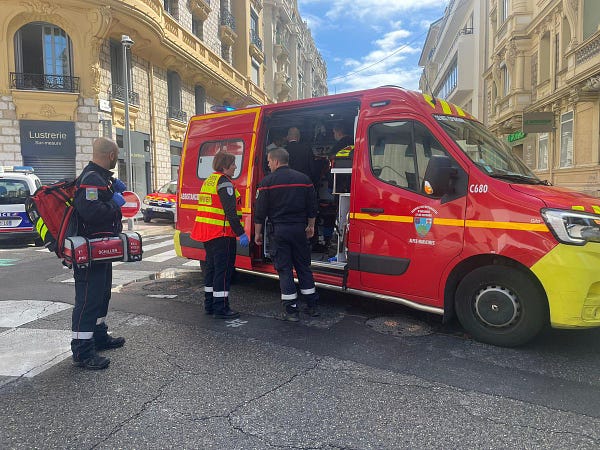
Their parish was packed on Monday, as Catholics in Nice gathered to pray for the victims.

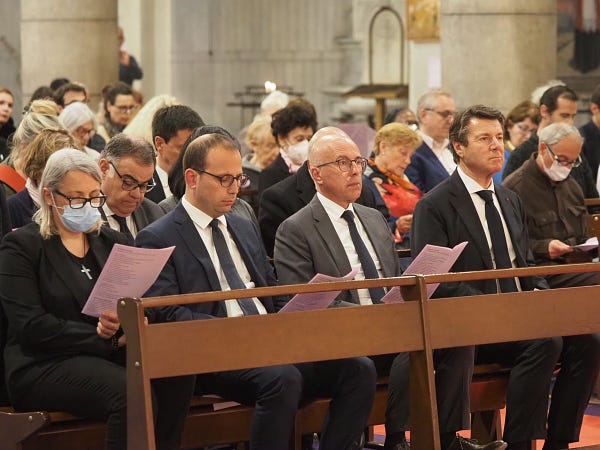
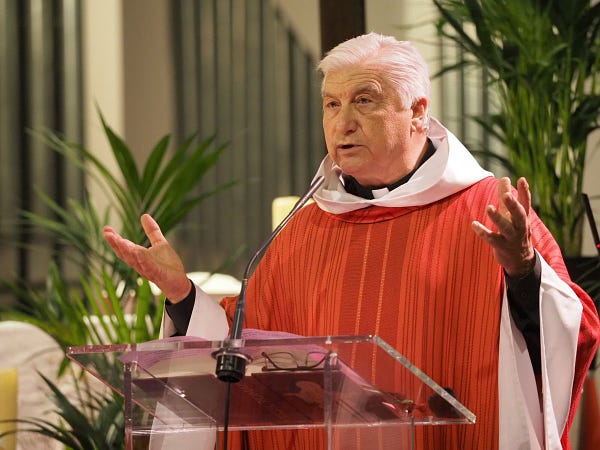
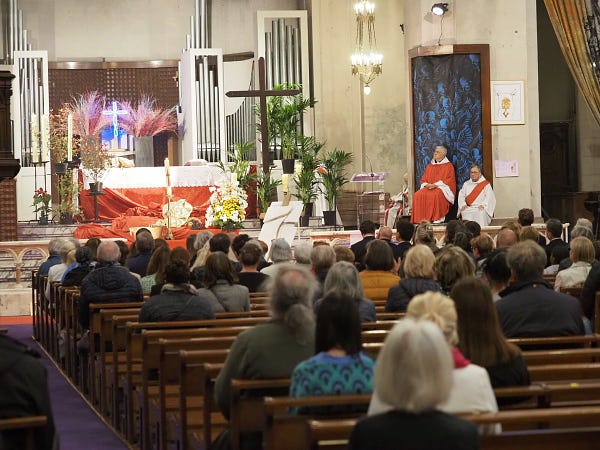
Let’s do the same.
Thank you
As you know, we planned to give alms this Lent by sending $10 for every new paid subscriber, and $1 for every new person on our mailing list, to the Archeparchy of Philadelphia’s Ukrainian Relief Fund.
We’ll send $3,707 to the fund this week — and that money will support the humanitarian work of the Ukrainian Greek Catholic Church — and it’s thanks to you. So, really, thank you.
Also, a head’s up — we have some important reporting coming down the pike in the days and weeks to come, so keep your heads up — and remember to subscribe and share, to keep The Pillar doing our work for the mission and integrity of the Church.
Please pray for us, and be assured of our prayers for you.
In Christ,
JDF

